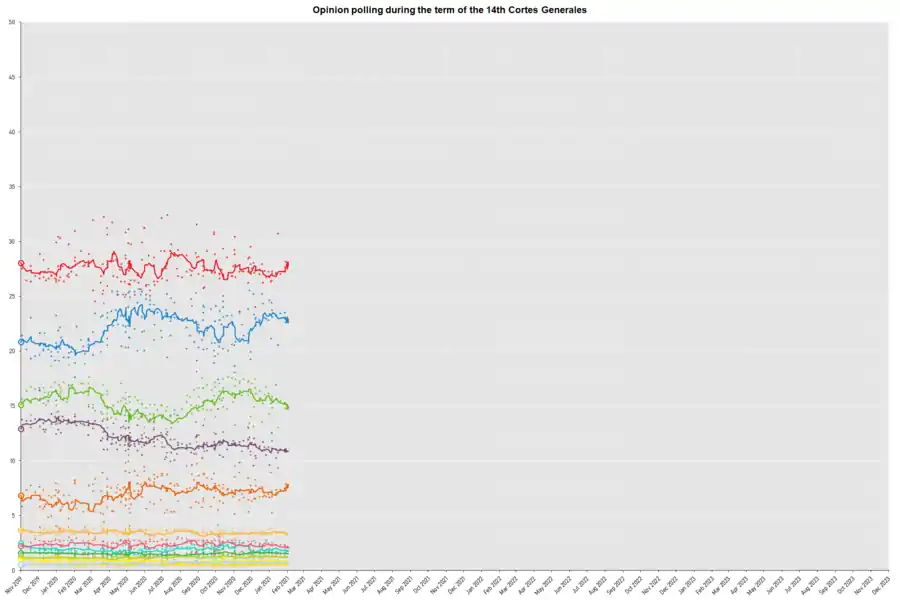Next Spanish general election
The next Spanish general election will be held no later than Sunday 10 December 2023, to elect the 15th Cortes Generales of the Kingdom of Spain. All 350 seats in the Congress of Deputies will be up for election, as well as 208 of 265 seats in the Senate.
| |||||||||||||||||||||||||||||||||||||||||||||||||||||||||||||||||||||
All 350 seats in the Congress of Deputies and 208 (of 266) seats in the Senate 176 seats needed for a majority in the Congress of Deputies | |||||||||||||||||||||||||||||||||||||||||||||||||||||||||||||||||||||
|---|---|---|---|---|---|---|---|---|---|---|---|---|---|---|---|---|---|---|---|---|---|---|---|---|---|---|---|---|---|---|---|---|---|---|---|---|---|---|---|---|---|---|---|---|---|---|---|---|---|---|---|---|---|---|---|---|---|---|---|---|---|---|---|---|---|---|---|---|---|
| Opinion polls | |||||||||||||||||||||||||||||||||||||||||||||||||||||||||||||||||||||
| |||||||||||||||||||||||||||||||||||||||||||||||||||||||||||||||||||||
| |||||||||||||||||||||||||||||||||||||||||||||||||||||||||||||||||||||
Overview
Electoral system
The Spanish Cortes Generales are envisaged as an imperfect bicameral system. The Congress of Deputies has greater legislative power than the Senate, having the ability to vote confidence in or withdraw it from a prime minister and to override Senate vetoes by an absolute majority of votes. Nonetheless, the Senate possesses a few exclusive, yet limited in number functions—such as its role in constitutional amendment—which are not subject to the Congress' override.[1][2] Voting for the Cortes Generales is on the basis of universal suffrage, which comprises all nationals over eighteen and in full enjoyment of their political rights.[3] Additionally, Spaniards abroad are required to apply for voting before being permitted to vote, a system known as "begged" or expat vote (Spanish: Voto rogado).[4]
For the Congress of Deputies, 348 seats are elected using the D'Hondt method and a closed list proportional representation, with a threshold of three percent of valid votes—which includes blank ballots—being applied in each constituency. Parties not reaching the threshold are not taken into consideration for seat distribution. Seats are allocated to constituencies, corresponding to the provinces of Spain, with each being allocated an initial minimum of two seats and the remaining 248 being distributed in proportion to their populations. Ceuta and Melilla are allocated the two remaining seats, which are elected using plurality voting.[1][5] The use of the D'Hondt method may result in a higher effective threshold, depending on the district magnitude.[6]
For the Senate, 208 seats are elected using an open list partial block voting, with electors voting for individual candidates instead of parties. In constituencies electing four seats, electors can vote for up to three candidates; in those with two or three seats, for up to two candidates; and for one candidate in single-member districts. Each of the 47 peninsular provinces is allocated four seats, whereas for insular provinces, such as the Balearic and Canary Islands, districts are the islands themselves, with the larger—Majorca, Gran Canaria and Tenerife—being allocated three seats each, and the smaller—Menorca, Ibiza–Formentera, Fuerteventura, La Gomera, El Hierro, Lanzarote and La Palma—one each. Ceuta and Melilla elect two seats each. Additionally, autonomous communities can appoint at least one senator each and are entitled to one additional senator per each million inhabitants.[1][5]
Election date
The term of each chamber of the Cortes Generales—the Congress and the Senate—expires four years from the date of their previous election, unless they are dissolved earlier. The election decree shall be issued no later than the twenty-fifth day prior to the date of expiry of the Cortes in the event that the prime minister does not make use of his prerogative of early dissolution. The decree shall be published on the following day in the Official State Gazette (BOE), with election day taking place on the fifty-fourth day from publication. The previous election was held on 10 November 2019, which means that the legislature's term will expire on 10 November 2023. The election decree must be published in the BOE no later than 17 October 2023, with the election taking place on the fifty-fourth day from publication, setting the latest possible election date for the Cortes Generales on Sunday, 10 December 2023.[5]
The prime minister has the prerogative to dissolve both chambers at any given time—either jointly or separately—and call a snap election, provided that no motion of no confidence is in process, no state of emergency is in force and that dissolution does not occur before one year has elapsed since the previous one. Additionally, both chambers are to be dissolved and a new election called if an investiture process fails to elect a prime minister within a two-month period from the first ballot.[1] Barred this exception, there is no constitutional requirement for simultaneous elections for the Congress and the Senate, there being no precedent of separate elections and with governments having long preferred that elections for the two Houses take place simultaneously.
Parliamentary status
The tables below show the current status of the parliamentary groups in both chambers.
|
| ||||||||||||||||||||||||||||||||||||||||||||||||||||||||||||||||||||||||||||||||||||||||||||||||||||||||||||||||||||||||||||||||||||||||||||||||||||||||||||||||||||||||||||||||||||||||||||||||||||||||||||||||||||||||||
Parties and candidates
The electoral law allows for parties and federations registered in the interior ministry, coalitions and groupings of electors to present lists of candidates. Parties and federations intending to form a coalition ahead of an election are required to inform the relevant Electoral Commission within ten days of the election call, whereas groupings of electors need to secure the signature of at least one percent of the electorate in the constituencies for which they seek election, disallowing electors from signing for more than one list of candidates. Concurrently, parties, federations or coalitions that have not obtained a mandate in either chamber of the Cortes at the preceding election are required to secure the signature of at least 0.1 percent of electors in the aforementioned constituencies.[5] The electoral law provides for a special, simplified process for election re-runs, including a shortening of deadlines, the lifting of signature requirements if these had been already met for the immediately previous election and the possibility of maintaining lists and coalitions without needing to go through pre-election procedures again.
Below is a list of the main parties and electoral alliances which will likely contest the election:
Opinion polls
Notes
- 1 ex-Cs.[9]
- The Gomera Socialist Group only fielded candidates for the Senate election.
References
- "Constitución Española". Act of 29 December 1978. Boletín Oficial del Estado (in Spanish). Retrieved 27 December 2016.
- "Constitución española, Sinopsis artículo 66". Congress of Deputies (in Spanish). Retrieved 12 September 2020.
- Carreras, Albert; Tafunell, Xavier; Soler, Raimon; Fontana, Josep (2005) [1989]. Estadísticas históricas de España, siglos XIX-XX (PDF) (in Spanish). 1 (II ed.). Bilbao: Fundación BBVA. p. 1077. ISBN 84-96515-00-1. Archived from the original (PDF) on 24 September 2015.
- Reig Pellicer, Naiara (16 December 2015). "Spanish elections: Begging for the right to vote". cafebabel.co.uk. Retrieved 17 July 2017.
- "Ley Orgánica 5/1985, de 19 de junio, del Régimen Electoral General". Organic Law No. 5 of 19 June 1985. Boletín Oficial del Estado (in Spanish). Retrieved 30 January 2020.
- Gallagher, Michael (30 July 2012). "Effective threshold in electoral systems". Trinity College, Dublin. Retrieved 22 July 2017.
- "Parliamentary Groups". Congress of Deputies (in Spanish). Retrieved 7 December 2020.
- "Parliamentary Groups since 1977". www.senado.es (in Spanish). Senate of Spain. Retrieved 8 July 2020.
- "Ciudadanos pierde un senador: Xavier Alegre se pasa al Grupo Mixto tras abandonar la militancia" (in Spanish). eldiario.es. 1 September 2020. Retrieved 1 September 2020.
.jpg.webp)
.jpg.webp)
.jpg.webp)
.jpg.webp)
.jpg.webp)
.jpg.webp)
.jpg.webp)
.jpg.webp)
.jpg.webp)
.jpg.webp)
.jpg.webp)
.jpg.webp)
.jpg.webp)

_(cropped).jpg.webp)
.jpg.webp)
